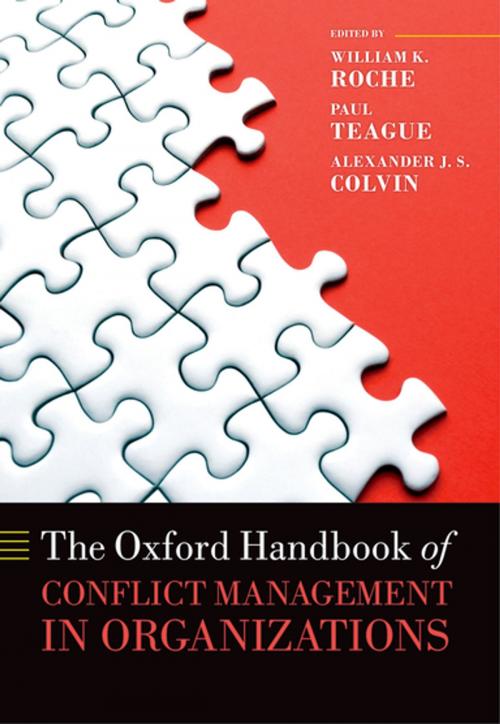The Oxford Handbook of Conflict Management in Organizations
Nonfiction, Reference & Language, Law, Business & Finance, Human Resources & Personnel Management| Author: | ISBN: | 9780191624568 | |
| Publisher: | OUP Oxford | Publication: | July 3, 2014 |
| Imprint: | OUP Oxford | Language: | English |
| Author: | |
| ISBN: | 9780191624568 |
| Publisher: | OUP Oxford |
| Publication: | July 3, 2014 |
| Imprint: | OUP Oxford |
| Language: | English |
New ways of managing conflict are increasingly important features of work and employment in organizations. In the book the world's leading scholars in the field examine a range of innovative alternative dispute resolution (ADR) practices, drawing on international research and scholarship and covering both case studies of major exemplars and developments in countries in different parts of the global economy. Developments in the management of individual and collective conflict at work are addressed, as are innovations in both unionized and non-union organizations and in the private and public sectors. New practices for managing conflict in organizations are set in the context of trends in workplace conflict and perspectives on how conflict should be understood and addressed. Part 1 examines the changing context of conflict management by addressing the main frameworks for understanding conflict management, the trend in conflict at work, developments in employment rights, and the influence of HRM on conflict management. Part 2 covers the main approaches to conflict management in organizations, addressing both conventional and alternative approaches to conflict resolution. Conventional grievance handling and third-party processes in conflict resolution are examined as well as the main ADR practices, including conflict management in non-union firms, the role of the organizational ombudsman, mediation, interest-based bargaining, line and supervisory management, and the concept of conflict management systems. Part 3 presents case studies of exemplars and innovators in the field, covering mediation in the US postal service, interest-based bargaining at Kaiser-Permanente, 'med-arb' in the New Zealand Police, and judicial mediation in UK employment tribunals. Part 4 covers international developments in conflict management in Germany, Japan, The United States, Australia, New Zealand, the United Kingdom and China. This Handbook gives a comprehensive overview of this growing field, which has seen an huge increase in programmes of study in university business and law schools and in executive education programmes.
New ways of managing conflict are increasingly important features of work and employment in organizations. In the book the world's leading scholars in the field examine a range of innovative alternative dispute resolution (ADR) practices, drawing on international research and scholarship and covering both case studies of major exemplars and developments in countries in different parts of the global economy. Developments in the management of individual and collective conflict at work are addressed, as are innovations in both unionized and non-union organizations and in the private and public sectors. New practices for managing conflict in organizations are set in the context of trends in workplace conflict and perspectives on how conflict should be understood and addressed. Part 1 examines the changing context of conflict management by addressing the main frameworks for understanding conflict management, the trend in conflict at work, developments in employment rights, and the influence of HRM on conflict management. Part 2 covers the main approaches to conflict management in organizations, addressing both conventional and alternative approaches to conflict resolution. Conventional grievance handling and third-party processes in conflict resolution are examined as well as the main ADR practices, including conflict management in non-union firms, the role of the organizational ombudsman, mediation, interest-based bargaining, line and supervisory management, and the concept of conflict management systems. Part 3 presents case studies of exemplars and innovators in the field, covering mediation in the US postal service, interest-based bargaining at Kaiser-Permanente, 'med-arb' in the New Zealand Police, and judicial mediation in UK employment tribunals. Part 4 covers international developments in conflict management in Germany, Japan, The United States, Australia, New Zealand, the United Kingdom and China. This Handbook gives a comprehensive overview of this growing field, which has seen an huge increase in programmes of study in university business and law schools and in executive education programmes.















